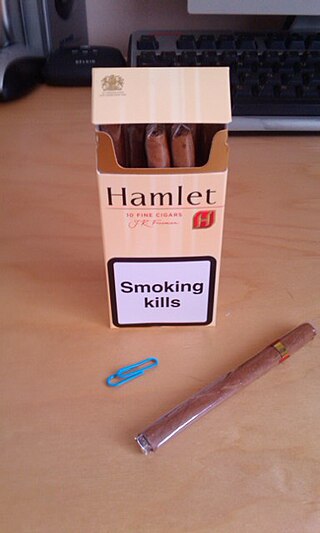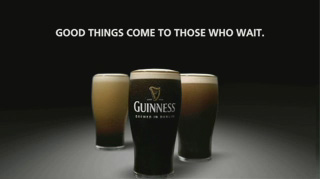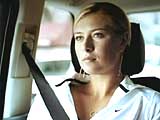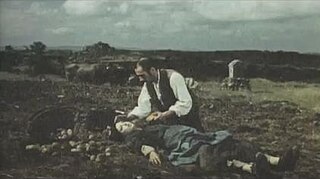
Foster's Lager is an internationally distributed brand of Australian lager. It is owned by the Japanese brewing group Asahi Group Holdings, and is brewed under licence in a number of countries, including its biggest market, the UK, where the European rights to the brand are owned by Heineken International.

Stella Artois is a pilsner beer, first brewed in 1926 by Brouwerij Artois in Leuven, Belgium. In its original form, the beer is 5.2 per cent ABV, the country's standard for pilsners. The beer is also sold in other countries including the UK, Ireland, Canada and Australia, where it has a reduced ABV. Stella Artois is owned by Interbrew International B.V. which is a subsidiary of the world's largest brewer, Anheuser-Busch InBev SA/NV.

A television advertisement is a span of television programming produced and paid for by an organization. It conveys a message promoting, and aiming to market, a product, service or idea. Advertisers and marketers may refer to television commercials as TVCs.

Cadbury Dairy Milk is a British brand of milk chocolate manufactured by Cadbury. It was introduced in the United Kingdom in June 1905 and now consists of a number of products. Every product in the Dairy Milk line is made with exclusively milk chocolate. In 1928, Cadbury's introduced the "glass and a half" slogan to accompany the Dairy Milk chocolate bar, to advertise the bar's higher milk content.

Carling Black Label is a lager distributed by Carling Brewing Company.
"Happiness is a cigar called Hamlet" was an advertising campaign for Hamlet Cigars, which ran on television from 1966 until all tobacco advertising on television was banned in the UK in 1991. The campaign returned in cinemas in 1996, continuing there until 1999, with the final commemorative advert and the modified tagline, "Happiness will always be a cigar called Hamlet."

Hamlet is a brand of cigar produced by the Gallaher Group division of Japan Tobacco. They are available in several varieties, miniatures and also a regular length. They were regularly referred to as the 'mild cigar' in their advertising.
"Papa" and "Nicole" were fictional characters created to advertise the Renault Clio in the United Kingdom between 1991 and 1998. The "Papa!" "Nicole" and "Nicole!" "Papa" verbal exchanges between Nicole and her father during the advertisements were adapted from an exchange between Nicole Bonnet and her father in the film How to Steal a Million from 1966.
Roderick Howard Allen was a British advertising executive who wrote many well known advertising slogans and jingles used in the United Kingdom. He was nicknamed the "jingle king".

"Good things come to those who wait" is an advertising slogan used by Diageo in television, cinema, and print advertising campaigns promoting Guinness-brand draught stout in the United Kingdom. The slogan formed the cornerstone of advertising agency Abbott Mead Vickers BBDO's successful pitch to secure the Guinness account in 1996. Their proposal was to turn around the negative consumer opinion of the length of time required to correctly pour a pint of Guinness from the tap, usually quoted as 119.5 seconds, as well as to encourage bartenders to take the time to do so. A similar idea had been incorporated into a number of Guinness campaigns in the past, such as the Irish "Guinness Time" television and cinema spots of the early 1990s.

Gorilla is a British advertising campaign launched by the advertising agency Fallon London on behalf of Cadbury Schweppes in 2007, to promote Cadbury Dairy Milk brand chocolate. The centrepiece of the campaign was a 90-second television and cinema advertisement, supported by related media purchases in billboards, magazines and newspapers, as well as sponsored events and an organised internet presence. The total cost of the campaign is estimated at £6.2 million. The central television advertisement was created and directed by Juan Cabral and starred the actor Garon Michael.

Sir Frank Budge Lowe is a British advertising agent who worked for Collett Dickenson Pearce, Lowe & Partners Worldwide, and Red Brick Road. He was knighted for services to charity and advertising.
St George is a multi-award-winning television commercial for the British soft drink, Blackcurrant Tango. The commercial was created by Chas Bayfield and Jim Bolton at the UK advertising agency, HHCL + Partners and was directed by Colin Gregg at the production company Eclipse for the client David Atter at Britvic.
Anthea Benton is a British television commercial and music video director, best known for her adverts for Stella Artois and Levi's.

Pretty is a television advertisement launched in 2006 by Nike, Inc. to promote its "Nike Women" brand of sportswear. The 60-second spot was handled by advertising agency Wieden+Kennedy in Portland, Oregon. The advert stars Russian tennis player Maria Sharapova in her first appearance as a spokesperson for the brand. Pretty debuted on U.S. television on August 20, 2006, with later appearances in cinemas and in print advertisements. It was directed by Czech director Ivan Zachariáš, with post-production and VFX work by The Mill.

Good Doctor is a television and cinema advertisement released in 2002 by Interbrew to promote its Stella Artois brand of lager within the United Kingdom. The 100-second spot was produced by advertising agency Lowe Lintas & Partners in London. Good Doctor premiered on British television in January 2002, with later appearances in cinemas. It is the seventh piece in the Jean de Florette-inspired "Reassuringly Expensive" series that had been running since 1992. The advert was directed by Czech director Ivan Zacharias with help from the production company Stink and post-production work by The Moving Picture Company. The commercial was a popular, financial, and critical success, boosting sales during the period in which it ran, and receiving more awards than any other campaign in 2002, including a Cannes Gold Lion, an Epica Award and several prizes from the D&AD Awards.
Mother is an advertising agency with offices in London, New York, Los Angeles, Shanghai, Singapore and Berlin.
Orange Man is a British television advertisement for the soft drink Tango Orange. Created by advertising agency HHCL, a longtime collaborator of Tango. The advertisement was produced in 1991 and aired in 1992, and was the first in the brand's "You Know When You've Been Tango'd" campaign that would continue until 1996 before returning for several years in the 2000s.
The Gold Blend couple was a British television advertising campaign for Nescafé "Gold Blend" instant coffee, developed by McCann Erickson and which ran from 1987 to 1993.

The history of advertising in Britain has been a major part of the history of its capitalist economy for three centuries. It became a major force as agencies were organized in the mid-19th century, using primarily newspapers and magazines. In the 20th century, It grew rapidly with new technologies, such as direct mail, radio, television. In the late 19th century, home-based British agencies were swallowed up and became branches of international firms, but London remains one of the world's most important advertising centers. Radical changes have come recently because of the new roles for the Internet and smart phones. For current conditions see Advertising.











